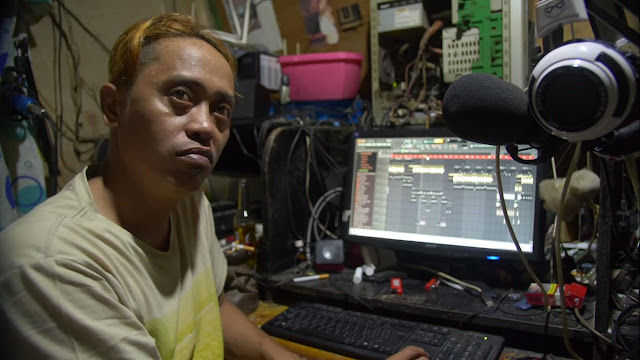On Mothering the Country and the World
 |
Lauren Greenfield's The Kingmaker may cling with the fascination of the Marcos regime, specifically the lavish lifestyle of Imelda Marcos and her grandeur vision for the country. But it proves that she is an unreliable narrator, telling her own narrative for her advantage. This trait is part of her appeal that refuses to fade. The film shows the rise and fall, and the rise again of the Marcos family in the Philippines. But the film also highlights the "motherly" side of Imelda which many believed that she is the one who "calls the shots," pulling strings behind the curtain.
The documentary film opens with an aerial tracking shot of decrepit Manila shanties with the background of high rise buildings, a sociological irony of the city, or in general, the Philippines. Imelda gives money to street children when her private vehicle stops. The children and some street vendors eagerly accept the money. "When I see Manila, I feel so depressed and sad. This was a little paradise," she says, recalling how great Manila was during their time. As she recalls, there were no beggars because they had a place for them. But she never tells where she put those beggars.
"My dream for my country is to regain paradise for all, and everything that was beautiful, that would make people happy, would be there. But I don't just dream. I want to give birth to it. I want to make it real," she says. What she wants, she really gets it, just like what she did to Calauit Island and how she illegally transported wild animals from Africa and displaced the people inhabited on the island. “I gave birth to what I dreamt of, and I always got my way,” she declares.
Truly, she misses being the First Lady of the country. "I miss the clout of being the First Lady. Not exactly the palace, because it was not really a very comfortable place to live in, but I miss the clout wherein, you can do so much," she says. When she was the First Lady, she did lots of projects; she had done lots of diplomatic travels abroad; met and made friends with influential leaders and some of them were dictators; conducted various charitable programs; organized extravagant parties; and of course the pleasure of having expensive shopping sprees and other secret purchases around the world. "I was always criticized for being excessive, but that is mothering. That is the spirit of mothering. You cannot quantify love," she justifies.
The first half of the film humanizes the Marcoses as though they are the victims of their own circumstances. But in the second half, Greenfield balances the narrative through interviewing the torture survivors of Martial Law, former Presidential Commission on Good Governance (PCGG) head Andres Bautista, former President Benigno “Noynoy” Aquino III, and Vice President Lenny Robredo, as well as the old pals of Ferdinand Marcos. As Filipinos who are familiar with the Marcos regime, we are accustomed and immune to Imelda’s dramas and other well-dressed lies. Thus, The Kingmaker has nothing new to offer with regard to the Marcos atrocities. The film manages to show important facts and events: their human rights violations and ill-gotten wealth; the assassination of Senator Benigno “Ninoy” Aquino which led to the spark of 1986 EDSA People Power Revolution; their deposed and exile; and their desperate attempts to bring back their honor, and reestablish their family name.
As the film progresses, it validates that they are, somehow, successful in reclaiming what has been taken from them. In one scene, high school students have asked what they think about the Marcos administration. Almost all of the students reply a pleasing answer. The film shows how historical revisionism and the miseducation of the youth can erase all of their crimes with the right propagandistic ingredients. “Perception is real, and the truth is not,” she says.
The film also shows the political alliance of the Marcoses with Rodrigo Duterte during the 2016 Philippine presidential election. When Duterte became the president, he reciprocated it by letting Ferdinand Marcos buried in the Libingan ng mga Bayani (Heroes Grave). This event, somehow, invalidates all of their crimes and established Marcos as one of the finest heroes ever produced. All of these favorable events have been witnessed by Imelda.
“You have many friends, and suddenly when you are not in power, they don't even know you,” says Imelda. This statement has two faces, especially when you are the Marcoses. The Marcos family still holds local and national posts. In the documentary, Imelda is the Congresswoman in her district, her daughter Imee is the Governor of Ilocos Norte, and his son Bong Bong is a Senator with an ambition to be the next president of the country. In short, they still have political machinery and clout that they already possessed from the beginning. Certainly, you cannot have permanent enemies, only permanent interest.
Imelda still has this magnifying allure that attracts some people that want to reminiscent her beauty and contrived grandeur. Her myth-making still titillates the public imagination which helps her to become relevant again, at least to her admirers and supporters. One cannot blame those people who want to adhere to her “utopian past,” oblivious of their atrocities, and accepts whatever mendacities she is offering. The Marcoses are not only guilty of such acts but also those who are willing to use power and other means for their own interest. Although the film resides in familiar ground, it is hard to disregard its haunting reminder about the danger of political dynasties.


Comments
Post a Comment
You are welcome to share your ideas with us in comments!